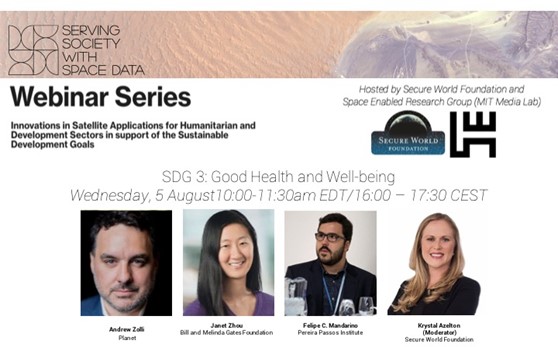Serving Society with Space Data - SDG 3: Good Health and Wellbeing
When: Wednesday, August 5, 2020
Time: 10:00 AM - 11:30 AM
Where: Virtual
Sustainable Development Goal 3: Good Health and Wellbeing seeks to ensure healthy lives and promote wellbeing for all at all ages. This webinar highlighted projects that have incorporated Earth observation data to promote public health in many areas ranging from disease to maternal health to COVID response.
Click here for the video
Objectives
- Sharing of real-world examples of how space technologies are being used for development projects related to health and more broadly by governments and other officials working on public health
- Including how Earth observation can provide decision-makers with data to make better policy decisions to increase improve livelihoods especially in light of COVID pandemic
- Highlight potential technical and other barriers that limit the operational use of Earth observations by decision-makers, project managers, and development partners
- Share pathways of collaboration and coordination/lessons learned
Panelists
- Andrew Zolli currently oversees Global Impact initiatives at Planet, a breakthrough space and AI organization that has deployed the largest constellation of Earth-observing satellites in history. He serves on the International Board of Directors of Human Rights Watch. Andrew is also the author of Resilience: Why Things Bounce Back, which has been published in more than a dozen languages worldwide.
- Janet Zhou is the deputy director of Strategy, Planning and Management for the Pneumonia, Enteric and Diarrheal Diseases (EDD), and Maternal, Newborn & Child Health Discovery & Tools teams. Prior to her current role, Janet ran the strategy and operations for the the Vaccine Development, Surveillance, and Malaria and Neglected Tropical Disease teams. She has also worked in the foundation’s central strategy team helping the Family Planning team develop its strategy and the Polio team conduct its midterm review for its eradication strategy. Her work has ranged from strategy development to implementation planning to change management to reviewing and adapting strategies. Before joining the foundation, Janet worked at the Boston Consulting Group on a variety of topics ranging from climate change to healthcare to technology. She has also spent time as a researcher at MIT, modeling the impact of healthcare reform in the United States, and as an independent consultant for REDF, a venture philanthropy seeking double bottom lines. Janet has a B.S. from MIT in Management Science and received her MBA from Harvard Business School.
- Felipe C. Mandarino is a Geographer who acts as City Information Coordinator at the Rio de Janeiro based Pereira PassosInstitute– IPP, a city government autarchy responsible for data, information and knowledge management. Has experience in GIS and remote sensing, climate change science, data and information management and analyzes. In his role within the City, Felipe coordinates two unique partnerships Rio has with US based Space sector organizations: NASA and Space Enabled/MIT. For the last couple of years is one of the city staff focused on the development of the city's Sustainable Development Plan and Climate Action, rooted both at the SDGs and the Paris Agreement. Since the beginning of 2020 is working heavily with data and analyzes related to the COVID-19 pandemic, including a participation at the VIDA Project, led by Space Enabled.
- (Moderator) Krystal Azelton oversees the Human and Environmental Security Portfolio at Secure World Foundation and has over 10 years of international and domestic space, public policy, and management experience. Prior to joining SWF, she served as a project manager at the Tauri Group, a leading aerospace analytics firm, providing research, analysis, strategic planning, and regulatory assessment to government and commercial clients. She led and supported the production of NASA’s strategic plans, audits, performance plans, budgets, and annual reports. Her work exposed to the full range of NASA’s Earth observation, human exploration, and aviation programs. Previously, Ms. Azelton was in the field of international development as a Monitoring and Evaluation Manager at Development Alternatives, Inc in Afghanistan working on US military and local government initiatives and as Senior Program Assistant at the National Democratic Institute in Africa and Washington, DC working on sustainable governance projects. In those roles, she worked closely with the United Nations, the World Bank, the Department of State, the Department of Defense, US and international nonprofits, and others.
About the Series
Co-hosted by the Space Enabled research group and the Secure World Foundation, this virtual series aims to engage a multi-sector audience in discussions on how space technologies and geospatial applications contribute to better outcomes in critical fields around the world, such as energy, food security, poverty, and governance. Held twice a month, the events will bring together stakeholders working in companies, nonprofits, academia, and government to highlight initiatives taken to progress toward the 17 Sustainable Development Goals (SDGs) using a truly transformative multi-stakeholder approach. The series will highlight real-world case studies as well as opportunities and challenges for expanding the use of satellite data in efforts to achieve the SDGs.
Please contact Director of Space Application Programs Krystal Azelton with any inquiries regarding this event.


 Share
Share